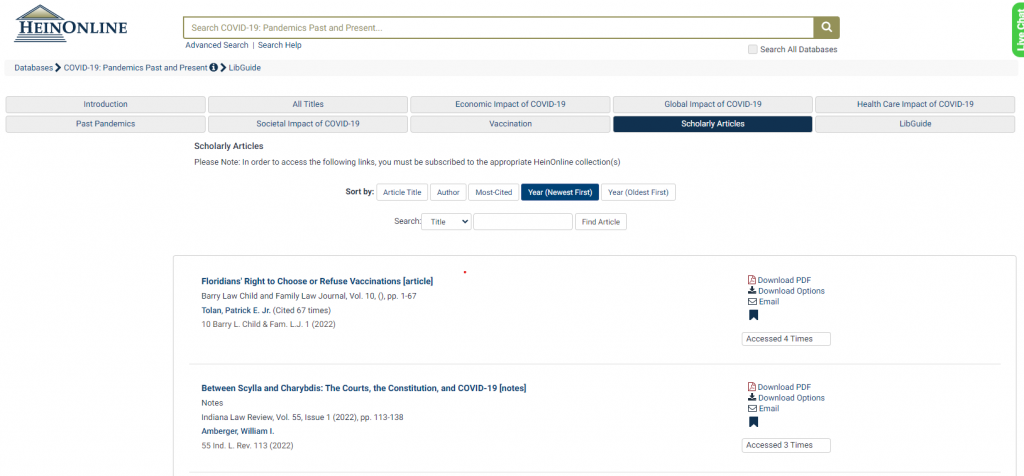It’s the start of a new school year, so this seems like the perfect time for us to introduce a new, occasional series from the HeinOnline blogging team! If you’re reading this blog, chances are you already know what a great tool HeinOnline is for conducting your own research. Now, we want to highlight ways that HeinOnline can also be used for instruction in the college classroom. In these posts, we will feature different ways educators can use HeinOnline to teach students about academic research and writing, and as a former university educator, I’ll share general suggestions, tips, and tricks for teaching in the college classroom.
For the first entry in this series, we’re going to focus on how to address one of the most common complaints from undergraduate students when they are assigned research essays: “I don’t know what to write about!” The early stages of the research and writing processes can be intimidating, particularly for first-year college students. One of the most important – and difficult – tasks in the early stage of research is coming up with useful academic questions to guide their research.
Before sending students off on their individual research projects, it is helpful to model and practice this set of skills with a group activity in class. In this post, we have some suggestions for ways you can use HeinOnline in an in-class activity that introduces students to the early stages of an academic research project.
In-Class Activity: Developing Good Research Questions
This activity takes advantage of HeinOnline’s curation into topical collections to help guide students as they develop focused academic research questions. Divide students into small groups and assign each group a database from HeinOnline. I chose the following five databases, but you can go with more or fewer, depending on your class size. Also, feel free to mix up the topics, depending on the interests and majors of your students. In this case, I tried to create a mix of topics to appeal to a broad variety of interests.
- COVID-19: Pandemics Past and Present (Access Database) | (View LibGuide)
- Gun Regulation and Legislation in America (Access Database) | (View LibGuide)
- LGBTQ+ Rights (Access Database) | (View LibGuide)
- Air and Space Law (Access Database) | (View LibGuide)
- Civil Rights and Social Justice (Access Database) | (View LibGuide)
Have your students take some time to read through the introductions to their assigned databases. Then, have them work together in their groups to begin developing questions by breaking their topic down into different ideas, subtopics, historical events, and facts. A good way to start this process is to have students make two different lists in their groups: a list of stuff they do know about their topic, and a list of stuff they do not know about their topic. From there, have students begin to transform their list of things they don’t know into question form. Encourage students to articulate questions that begin with “how,” “why,” and “what if” and to avoid questions that are easily answered with “yes” or “no.”
One challenge that students often encounter at early stages of research is when they choose a topic that is too broadly defined, such as “gun control” or “the obesity epidemic.” For example, I have often encountered students who begin with a research question such as “Should there be gun control?” This sort of “yes/no” question lends itself to a simplistic “pro/con” style of argument that has the effect of constraining research. Instead, I suggest that students try to come up with “how” and “what if” questions. A far better research question would be something like: “How could gun control legislation be implemented?” or “What would be the impact on violent crime rates if an assault weapons ban were implemented?” These are the kinds of questions that can be investigated with academic research using the collections in HeinOnline.
As a group, have students come up with a few research questions to discuss. Then, have them evaluate the effectiveness of their research questions using the following diagnostic questions:
- Can your question be answered with a simple yes/no? If so, it is probably not focused and specific enough.
- Could your question conceivably be answered (proved or disproved) using evidence?
- Is there consensus on this issue already? (If so, it might not be worth researching!)
Have each group choose one of their research questions to share with the whole class.

This activity can lead neatly into another set of activities on academic research and scholarly articles. After students come up with questions to guide their research, have them start to get some practice using HeinOnline’s databases to locate scholarly sources that could begin to address their questions. For homework, have your students find one scholarly article from their assigned database that seems like it could answer at least part of their research question. For reference, here are some helpful blog posts on searching in HeinOnline and downloading and printing documents. For bonus points, you can have your students use HeinOnline’s PathFinder tool to explore connections between disciplines and find what overarching subject (or subjects) their article falls under.
Other Resources
Stay tuned next month for more classroom tips! In the meantime, here are some other resources that could be helpful in guiding your students through the early stages of research:
- The Purdue Online Writing Lab has a lot of helpful resources on all stages of the research, drafting, and revision process. Their citation and style guide is also excellent.
- The UC Merced Library has a great set of other activities and lessons on developing good research questions.
Classroom Tip of the Month
Students learn, communicate, and participate in the classroom in different ways. Some students who may be uncomfortable participating in whole-class discussions excel in smaller groups of their peers. Likewise, some students who prefer not to talk at all in class express themselves well in writing, or in online discussion forums. Try to provide students with a variety of opportunities to communicate in different ways during each class session. I like to make sure each class includes opportunities for quiet, individual writing (usually about 5-10 minutes at the beginning of class); directed activities or discussion in small groups; and larger, more open-ended discussion as an entire class.



